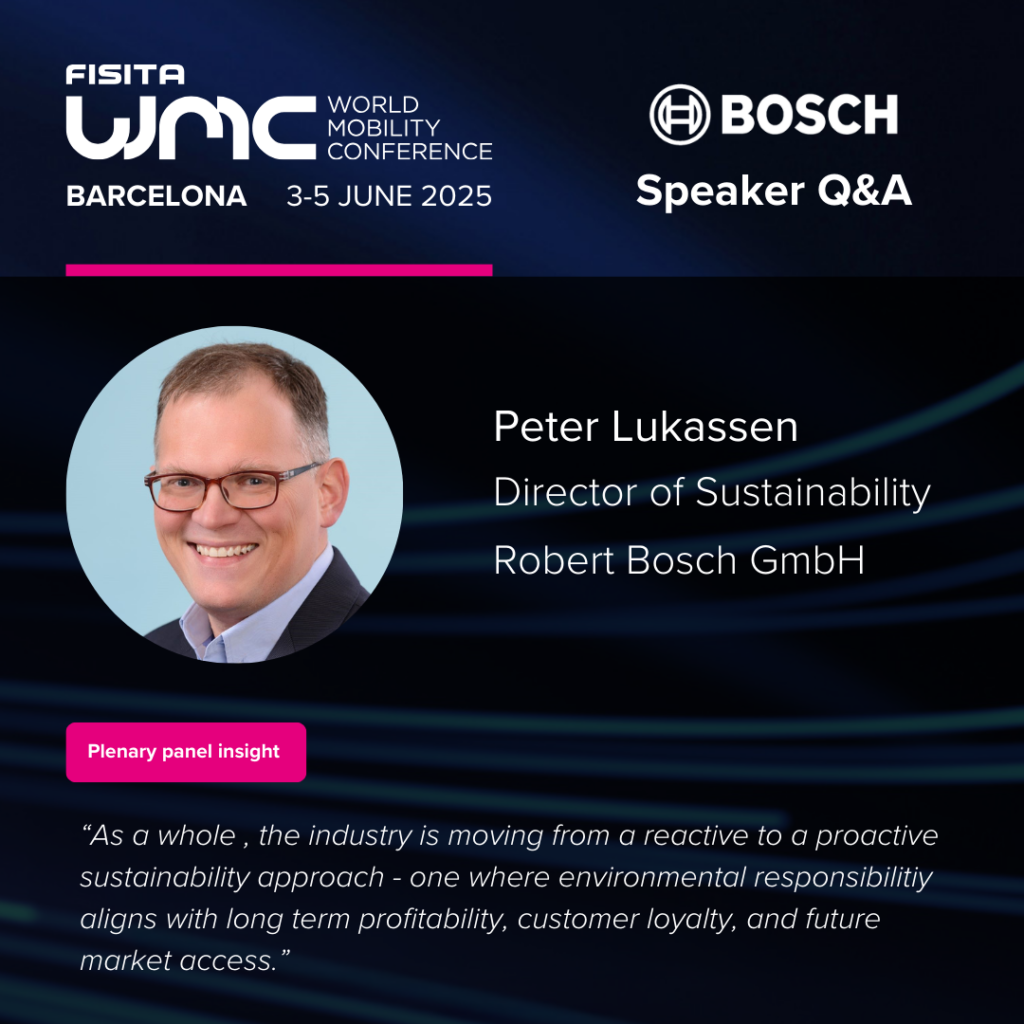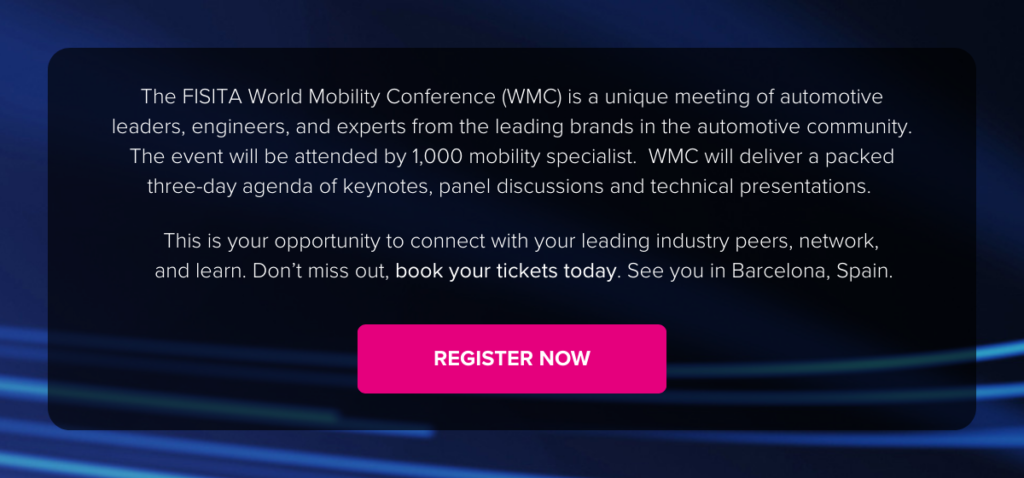Peter Lukassen, Director of Sustainability at Robert Bosch talks to FISITA CTO Martin Kahl about sustainable mobility and the circular economy.
One of the highlights of the 2025 FISITA World Mobility Conference will be the plenary panel discussion on sustainability and circularity in the automotive industry, featuring experts from The Future is Neutral, Geely Holding, Toyota Motor Europe, and Robert Bosch.
Peter Lukassen is responsible for operational sustainability in the Mobility Aftermarket division of Robert Bosch GmbH, driving the global sustainability strategy along the entire value chain. After holding positions in manufacturing coordination and logistics, Peter took over the responsibility for circular economy business development before heading the sustainability topics in 2022.
Peter will participate in the FISITA WMC plenary panel on “Sustainable mobility and the circular economy,” alongside Sophie Schmidtlin, CTO of The Future is Neutral, Dr Yuan Shen, CTO at Geely Holding, and Umit Sengezer, Head of Circular Economy at Toyota Motor Europe.
Ahead of his appearance at the conference, FISITA spoke to Peter and asked him to share some thoughts on the key topics of the panel.
Automotive is one of the most disruptive and disrupted industries; from your perspective, is sustainability being sufficiently embraced as a business strategy, or still seen as a compliance cost – and how do you see this changing?
Across the global automotive industry, sustainability is increasingly being recognized not just as a regulatory requirement but as a strategic imperative. This shift is driven by evolving consumer expectations, investor pressure, tightening environmental regulations, and the accelerating transition to low-emission mobility.
Many OEMs and Tier 1 suppliers are now embedding sustainability into their core business models—from raw material sourcing and production to vehicle design, end-of-life treatment, and aftermarket services. However, the pace and maturity of this integration still vary widely. For some, particularly in markets with less regulatory pressure, sustainability remains primarily a compliance-driven effort, often focused on reporting and risk mitigation rather than opportunity creation.
At the forefront, companies like Bosch are redefining the narrative. Sustainability is treated as a growth driver, with structured programs targeting CO₂ reduction, circularity, and resource efficiency. Between 2018 and 2023, Bosch achieved a remarkable 82% reduction in Scope 1 and 2 emissions, and a 27% reduction in Scope 3, totalling 123 million metric tons of CO₂e avoided—an achievement equivalent to the annual emissions of 22.8 million European citizens (according to data from the World Bank).
This transformation is industry-wide, with notable examples, such as a OEMs like Volvo, BMW, and GM committing to fully electric lineups and carbon-neutral production facilities; aftermarket players innovating in remanufacturing, parts recycling, and reverse logistics; and startups and mobility tech firms driving disruptive, sustainability-first solutions across shared, autonomous, and connected mobility.
As a whole, the industry is moving from a reactive to a proactive sustainability approach—one where environmental responsibility aligns with long-term profitability, customer loyalty, and future market access. The trajectory is clear: in tomorrow’s mobility ecosystem, sustainability will be a prerequisite for success, not just a reporting line.
Electrification is just one way in which automakers can achieve cleaner mobility; what else should the industry consider in the quest to reduce the environmental impact of mobility?
Electrification is only part of the solution. Bosch promotes a multi-pronged strategy that addresses the entire product lifecycle, not just tailpipe emissions, and includes consideration of fuel cell technology, end-of-life battery handling, sustainability in logistics, and sustainable packaging.
Fuel cell technology offers low-emission alternatives, especially for long-haul and commercial transport. Fully automated battery-discharging equipment to handle used EV batteries in Europe enables safer and faster recycling. Sustainable transportation logistics, including the use of electric trucks, intermodal transport, and renewable diesel (HVO100), demonstrates a lifecycle approach to reducing carbon emissions; as does packaging and product redesign, such as using recyclable cardboard packaging and reducing single-use plastics.
This systems-thinking approach significantly broadens the definition of “clean mobility.”
Circular economy is becoming an accepted business practice in the automotive industry, but it’s far from maturity. How easy is it to build circularity into mass-market business models and into mainstream manufacturing processes and operations?
Building circularity into mass-market automotive operations is challenging but increasingly feasible, and Bosch eXchange has already been an integral part of our aftermarket offering for more than 60 years. Bosch highlights three key enablers.
The first of these is design for circularity, whereby products must be designed from the outset to support reuse, remanufacture, and recycling.
The second is reverse logistics infrastructure; Bosch is expanding its collection of used cores not only from workshops but also from scrapyards and dismantling centres to close the material loop. Circular Economy Solutions GmbH, our dedicated subsidiary, delivers an end-to-end industry offering designed to support circularity across the value chain.
The third is business model adaptation; circularity demands significant shifts—remanufacturing is an industrialised process, while recycling demands careful disassembly and material recovery.
While not trivial, Bosch’s progress shows that circularity can scale with strategic investment, process innovation, and ecosystem collaboration.
What can the automotive industry learn from other industries about sustainability and circular economy? And what can other industries learn from automotive?
The automotive sector can learn from consumer electronics and household appliances, where modular design and product-as-a-service models (e.g., leasing) are more mature. Bosch itself employs lease-based models for household devices and integrates 85% recycled plastic into products like the Quigo Green laser.
On the flip side, other sectors can learn from automotive’s industrialization of circular processes. For example, Bosch’s standardized remanufacturing of diesel systems, starters, alternators and electronic components shows how to efficiently scale second-life solutions.
Automotive’s experience with stringent safety, regulatory, and durability requirements also teaches other sectors how to embed sustainability without compromising performance or safety.
As a speaker at the FISITA World Mobility Conference, what is your key message to delegates?
The message is clear: “Sustainability and profitability are not in opposition—they are co-drivers of future mobility.” Bosch’s journey illustrates that with the right frameworks, innovation, and leadership, sustainability can be embedded across the entire automotive value chain, from design to recycling, from manufacturing to mobility services.
The focus should be on the following four areas: closing material loops to conserve resources and reduce waste; investing in holistic clean technologies beyond electrification, including hydrogen and
circular services; reinventing supply chains to support reverse logistics and circularity; and measuring and verifying impact, as Bosch does through audited product carbon footprint (PCF) calculations.
Ultimately, the industry must shift from a linear mindset to a sustainable, circular ecosystem, delivering cleaner mobility solutions that also drive business success.

